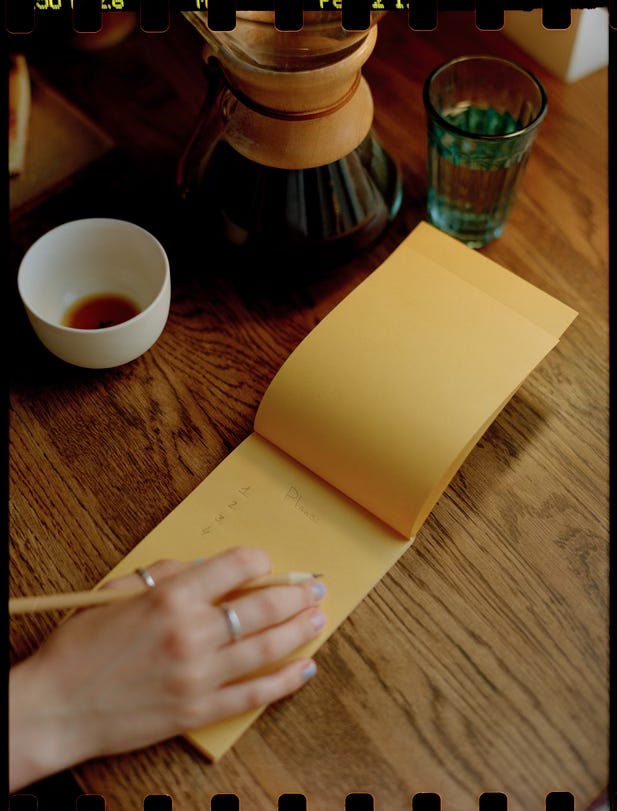Let’s dive into the tricky and frustrating world of writer's block—shorthand for not having written in a while, and feeling unable to write—and come out the other side with some tricks for breaking through it and maintaining a steady writing flow. I want to share with you all a better understanding of writer's block, gift you some new tools for staying on track with your writing, and give you the mindset and energy to tackle whatever writing project you want to pursue with confidence and ease.
In my career as a writing teacher, as well as a working writer, I’ve spoken to a lot of writers about their experiences with writer’s block, whether they call it that or not. They might refer to it as “feeling stuck,” or they might just say, “I haven’t written in a while, but I figure it’ll start up again.” Or it might just feel like a horrific enemy—a force determined to keep you from writing at all. Some people treat the impulse to write in the way writers of yore used to refer to muses—sometimes it visits, sometimes it doesn’t, and we’ll be damned if we know how to get it to show up.
But if you’re subscribed to this newsletter, you probably consider yourself a writer… and yet, for whatever reason, you’ve found it wretchedly difficult to get going on your writing. Maybe you’ll write a sentence or two, and find the effort so much that you walk away from your computer and don’t touch it again for another month.
Or even the thought of writing makes you freeze up, so the seemingly simple act of opening a document seems equally tough as writing the Great American Memoir.
You’re definitely not alone. According to research by American psychologist Robert Boice, at least 60% of writers experience writer's block at some point in their careers.1 I personally think that this is a wildly low estimation, but it’s still over half.
In a survey of over 800 readers by the writers' resource website Reedsy, almost 80% of respondents cited writer's block as one of the biggest challenges they face when writing.2 Isn’t that wild? It isn’t, say, research, coming up with what to write, or trying to find an agent. It’s writer’s block. The act of being blocked.
One of the strangest periods that I experienced with writer’s block occurred when I was working on edits for The Collected Schizophrenias, my second book, and I also happened to be on a Disney cruise with my family. My niece was running around during the day, giggling and having fun, my parents were taking part in the cruise’s daily activities, and my partner was watching Disney movies everywhere he could (which is basically what everyone’s doing, on a Disney cruise), and I had a giant document that I was supposed to be editing. And when I say “editing,” I don’t mean that I needed to move some sentences here and there. I needed to write new things. I needed to write new content. But I just… couldn’t find the juice. I couldn’t figure out how to get going, not because I was on a Disney cruise, but because my brain felt like it was stuck in cement—or, in contrast, jolting from side to side in an uncontrollable fashion. When the ocean waves got bad, it was almost impossible to go through the lunch buffet without lurching from side to side, nearly dropping your tray. And that’s kind of what my writer’s block was feeling like.
To diminish our writer’s block, we need to define what writer’s block is and learn what causes it.
Pulitzer Prize-winning writer Jennifer Egan referred to writer's block as "creative block," and described it as "the feeling of being like a corded appliance that's unplugged--you might as well not exist."3 And according to an article in The Guardian, writer's block can be caused by a variety of factors, including anxiety, depression, career dissatisfaction, and perfectionism.4
I’ve also found it helpful to look at the different types of writer's block and the symptoms to look out for. Here are some of the symptoms that I’ve experienced:
Don’t “feel like” writing (ennui)
Have “nothing to write about”
Was taken off-course by a negative writing event, such as a rejection. A well-known writer, a friend of mine, kept going to their agent with new writing projects. And every time, the agent told them that it wasn’t the right project—it wasn’t a good fit. (This also happened to me, but in the case of my friend, their project was a completely new project each time, which I think makes it so much harder to keep trying.)
The sensation of being stuck
Decreasing amounts of writing
Not wanting to think or talk about writing
So, how the heck do we break through writer’s block? I have a few practical techniques for overcoming writer's block, such as free writing, brainstorming, and using prompts—not all of them will work for you, but they’re worth trying. You might just find something that feels right.
First off, identify the source of your writer's block. Take some time to understand the underlying causes of your writer's block. Is it due to a lack of ideas or inspiration, difficulty with the writing process itself, or something else?
When you’re having any of the underlying causes I just listed, it can be helpful to experiment with different writing techniques. If you're feeling stuck, try using a different approach to your writing, such as free writing, brainstorming, or using prompts. (Prompts are everywhere on the Internet—but I highly recommend
for a really robust curriculum and community. Jeannine is amazing with providing prompts.)Try writing at different times of the day or in different environments to see what works best for you. Sometimes, that gorgeous writing space that’s always worked for you is just not doing it right now, and you need to work in the local library instead, or on the sofa in the living room. Maybe even though the early morning has tended to be your best writing time, giving the evening a go could be best these days.
Break your writing into manageable tasks. Writing can feel overwhelming, especially when dealing with a long, complex project. Dr. Cyrus Foroughi from the University of California, Irvine, found that taking short breaks while writing can reduce the intensity of writer's block and increase productivity.5 Therefore, break your writing down into small, manageable tasks, and set achievable goals and deadlines for each one. This will help you stay focused and motivated as you work towards completing your project. And remember: your goals and deadlines don’t need to mean that you’re writing every single day. That’s something Stephen King does, but it’s much harder for us mere mortals to attempt. (Read my piece, You Don’t Have to Write Every Day to “Be A Writer,” for more about building a writing habit while living with limitations.)
I hope these tips are helpful for you as you start to hammer against your writer’s block. But if you'd like some additional tips, tricks, and words of encouragement, I’d love to recommend one of the basic Academy 101 classes from The Unexpected Shape Writing Academy, my online writing school for ambitious writers living with limitations such as chronic illness, caregiving responsibilities, and/or disability. There’s a class called the One-Day Writing Kickstart just for you about this topic ($97).
(And if you aren’t able to spend $97 on a writing class, there’s also The Unexpected Shape Cafe, a free forum of kind fellow-writers where you can earn points toward classes by posting.)
Thank you for creating The Unexpected Shape Writing Academy.
I’ve been moved and delighted by the diverse group of guest speakers and fellow students. So many of the writing workshops and conferences I’ve attended in the past have been very much from a white person’s perspective, whether that was intended or not. I’m so glad you have created a space that will foster writers to write and publish diverse and interesting stories.
— VM
"Wanted to share I finally signed a publishing contract for my first creative nonfiction that deals with sexual trauma, hysteria & liminality! After struggling to find a publisher, there were three publishers offering me a contract. Thank you so much for your brilliant workshops!"
— Susannah H.
Learn more about the One-Day Writing Kickstart here.
If you’re interested in the large online writing school (The Unexpected Shape Writing Academy), which is a self-paced curriculum bursting with a full curriculum from pre-writing to writing to publication, guest lectures from a bevy of brilliant writers, including Meghan O’Rourke, Melissa Febos, Mitchell S. Jackson, Eula Biss, Yahdon Israel, Stephanie Foo, Hanif Abdurraqib, Vauhini Vara, Leslie Jamison, T Kira Madden, Soleil Ho, Suleika Jaouad, Camonghne Felix, and a robust community besides, for $97/month, learn more about that here.
Source: "The Psychology of Writer's Block" by James Clear, New York Times
Source: "7 Tips to Combat Writer's Block" by Diana Urban, New Yorker
Source: "Jennifer Egan's Travels Through Time" by Isaac Chotiner, New Yorker
Source: "How to Overcome Writer's Block: Top Authors and Writers Reveal Their Secrets" by Danuta Kean
Source: "How to Overcome Writer's Block: 14 Tricks that Work" by Bryan Collins, Forbes






I love this! When I´m feeling blocked, exhausted, I just write on my diary, utterly freedom. I make drawings, all for me, not to be shown to anyone. i give it time.. i walk... rest, sleep... the creative mind eventually comes back... Thank you, Esmé, loved reading about writing :)
I recall a tongue-in-cheek quip by Danlil Kharms, who was a Russian revolutionary during the time of czars. (There’s a beautiful collection of shorts called “Today I Wrote Nothing”)
He writes, “I was most happy when pen and paper were taken from me and I was forbidden from doing anything. I had no anxiety about doing nothing by my own fault, my conscience was clear, and I was happy. This was when I was in prison.”